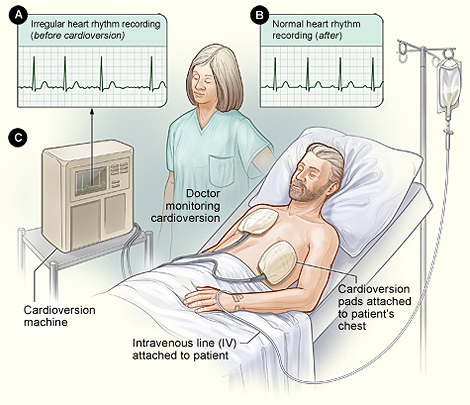What To Expect During Cardioversion
A nurse or technician will stick soft pads called electrodes on your chest and possibly on your back. He or she may need to shave some areas on your skin to get the pads to stick.
The electrodes will be attached to a cardioversion machine. The machine will record your heart's electrical activity and send low-energy shocks through the pads to restore a normal heart rhythm.
Your nurse will use a needle to insert an intravenous (IV) line into a vein in your arm. Through this line, you’ll get medicine that will make you fall asleep.
While you're asleep, a cardiologist (heart specialist) will send one or more low-energy electrical shocks to your heart. You won't feel any pain from the shocks.
Your health care team will closely watch your heart rhythm and blood pressure during the procedure for any signs of complications.
Cardioversion

The image shows a typical setup for a nonemergency cardioversion. Figure A shows an irregular heart rhythm recording (before the cardioversion). Figure B shows a normal heart rhythm recording (after the cardioversion). Figure C shows the patient lying in bed with cardioversion pads attached to his body. The doctor closely watches the procedure.
Cardioversion takes just a few minutes. However, you'll likely be in the hospital for a few hours due to the prep time and monitoring after the procedure.
Clinical trials are research studies that explore whether a medical strategy, treatment, or device is safe and effective for humans. To find clinical trials that are currently underway for Cardioversion, visit www.clinicaltrials.gov.
The NHLBI updates Health Topics articles on a biennial cycle based on a thorough review of research findings and new literature. The articles also are updated as needed if important new research is published. The date on each Health Topics article reflects when the content was originally posted or last revised.
















